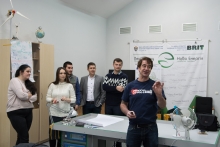
Everybody knows how difficult it is to implement a large-scale project and it doesn't matter whether it is concerning private life or business. We encounter new ideas both in the classroom and in the workplace and sometimes we don't know how to realize them. Finally, all of us want Ukraine to become a modern European state. But usually big things require a lot of effort and a long time to implement.
Is it possible to accelerate this process and make it more effective? Yes, it turns out so. But you have to learn how to apply your gift of creativity. Today, this art was mastered by teachers and employees of Ivano-Frankivsk National Technical University of Oil and Gas under the guidance of an experienced coach - Dr. Richard Tomlins from the University of Coventry (UK). Mr. Richard tells us about the program «Creative Spark: Higher Education Enterprise Programme» within which IFNTUNG hosted his workshop on rapid prototype development:
It was founded by the British Council for universities to create trainings for creative entrepreneurs. We are trying to find out what kind of program should it be, because we think that opinions of local people are important. Secondly, we aim at spreading of very simple techniques that can be used independently, in particular Sprint. "Sprint" is a quick prototype building, which is not necessarily a physical subject, but may consist of a strategy developing within 2.5 hours.
This technique can be used by students and entrepreneurs, because it is a skeleton, a foundation for people who already run a business or are about to start their own business. It can be any type of business - in the realm of creative economy, cinema, music, theater, information technology, architecture ...
What could this mean for each of us in particular?
Mr Richard explains:
It is interesting how the principles of a creative economy can be used by people just for life, for creating jobs. It can help them feel happier, more confident ... We are interested in changing the statistics in the local economy and lives of local people as a result of such events. It is also interesting how many companies in the so-called traditional industry use a creative approach, because they also have their creativity, as in the theatrical or musical business. In general, I believe that the element of creativity is present even in the oil and gas industry, in experiments aimed at creating innovations.
Is it easy to find a creative "vein"? All the participants of the workshop felt it. They have been generating interesting ideas and persistently looking for the ways of their realization. Actually, that is what our society is lacking sometimes. Prof. Maxym Karpash, Vice-rector for International Affairs, emphasizes:
The more successful companies in the creative industry we have, the more of them will appear in the future. Because there are lots of good ideas, but we have problems with their implementation and proper marketing. Our project is intended to fill this gap and help these ideas reach the market.
The main idea of the program, funded by the British Council in Ukraine, is to create centers of support for creative entrepreneurship at Ukrainian universities. The creative industry today should be the dominant direction, because it is designed to realize the potential accumulated by society, and meets its needs.
Our university has applied to participate in such a program, has passed a competitive selection and now we take part in it together with the University of Coventry. The project provides online English courses from the British Council. Besides, for selected postgraduate students and master students in almost all field of study there will be an additional course of English for Specific Puroposes . They will be taught a course in creative economics, and then a contest of their projects in English will take place. The authors, selected by the British Council, will have the opportunity to travel to the UK, present their projects and possibly get funding for their implementation. Our young scientists, postgraduate students, and doctoral students will benefit twice from this - they will increase their English proficiency, gain new knowledge of the creative economy and will be able to implement their projects.
